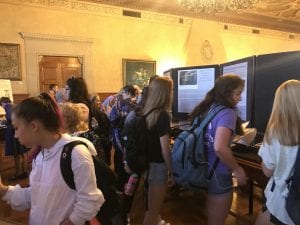By Meagan Anthony, English Ph.D. Candidate, Armstrong Browning Library Graduate Research Assistant
On October 4th and 5th, the Armstrong Browning Library co-hosted our first hybrid symposium, Rhyme and Reform: Victorian Working-Class Poets and Elizabeth Barrett Browning’s “The Cry of the Children”, along with the University of Strathclyde and the University of Manchester. This multi-site, digitally-networked symposium about Victorian portrayals of industrial labor and verse coincided with the 175th anniversary of Elizabeth Barrett Browning’s poem “The Cry of the Children,” which protested the abuse of child workers in British mines and factories. Rhyme and Reform’s schedule of events included in-person and live-streamed presentations, on-site workshops featuring the digital editing tool COVE, and an exhibition. Below, Armstrong Browning Library’s Graduate Research Assistant, Meagan Anthony writes about her decision to bring her English course to the opening reception of Rhyme and Reform’s exhibit.
*****
As an instructor, I think linking classroom discussion with real world events is an important tool for students to transition classroom ideas into their everyday lives. This semester I am teaching the FAS (Freshman Academic Seminar) Protest Writing and Civil Disobedience. We began looking at the protest writing of the American Independence Movement and will continue up to the #MeToo Movement and March for Our Lives.
Coincidentally, the week Rhyme and Reform took place, my class was reading about the protest writing of the American tenement dwellers and factory workers. The symposium fit in with our discussion perfectly. Not only could the students see how other scholars presented work regarding protest literature, but they were able to see and experience that the issues with working and living conditions in 19th century America were not limited to America, or that century. Elizabeth Barrett Browning’s poetry also offered the students a new genre for discussion. Our active questions included: How does the genre of protest writing effect the message? What rhetorical techniques are unique to certain genres and which are shared by others? By what past text is this author influenced? How would readers have responded to this text at the time? How should we respond to it?
My class thoroughly enjoyed their experience at the ABL and noted that the few classmates who were unable to make class that day had truly missed out. Events like Rhyme and Reform help us to keep literature and historical writing relevant and living. Throughout the semester my class will engage with many instances of injustice and reform through historical texts and literature in order to come to the understanding that these issues are cyclical. We are not experiencing new forms of oppression or disenfranchisement; we are simply experiencing new waves of conflict. Looking back at former protest voices aids us by showing where we have come from and envisioning what our next steps should be.



